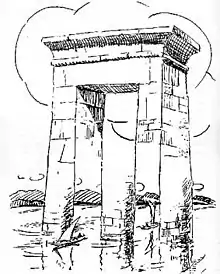Roger Hayward
Roger Hayward (1899 - October 11, 1979) was an American artist, architect, optical designer and astronomer. He is the inventor of an early Schmidt-Cassegrain camera that was patented in 1945. He was born on January 7, 1899 to mother, artist Ina Kittredge (Phelps) Hayward and local businessman and time piece hobbyist Robert Peter Hayward. He was the grandson of American landscape artist William Preston Phelps.[1]

Hayward's "undecidable monument"
In December 1968 he wrote "Blivets: Research and Development" to The Worm Runner's Digest in which he presented interpretations of impossible objects.[2]
References
- Bell, Trudy (September 2007). "Roger Hayward: Forgotten Artist of Optics". Sky and Telescope. 114 (3): 30–37. Bibcode:2007S&T...114c..30B.
- US Patent 2,403,660, Schmidt-Cassegrain camera
External links
- The Roger Hayward Papers
- Roger Hayward - Renaissance Man, a biography of Roger Hayward written by his family members and published by Oregon State University
- A digitized collection of pastel drawings of molecules created by Hayward
This article is issued from Wikipedia. The text is licensed under Creative Commons - Attribution - Sharealike. Additional terms may apply for the media files.